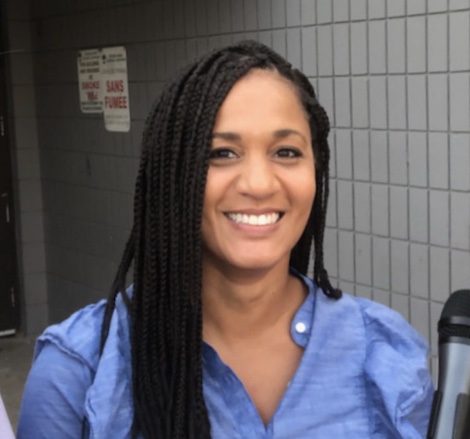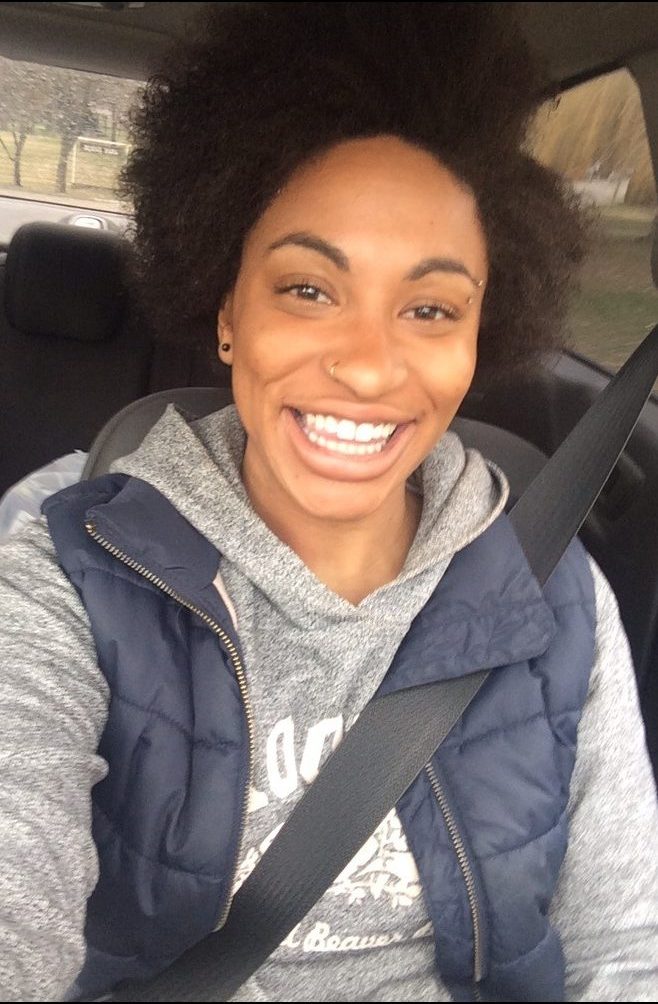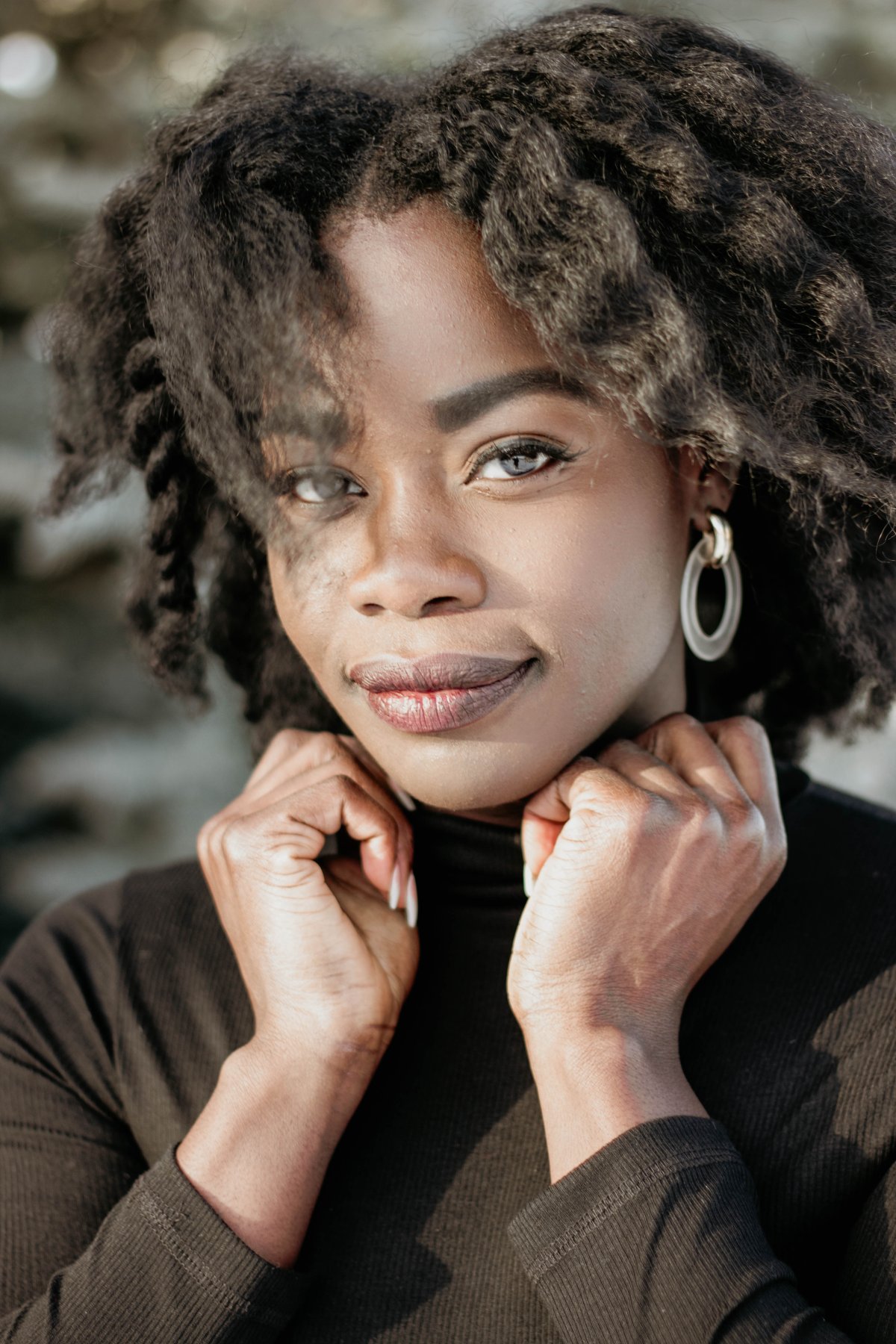A four-hour drive over mountain passes is the only way Temeeka Guy can get her hair braided.

When the 29-year-old woman moved to Grand Forks, B.C. from the Toronto area, she knew it would be difficult to access hair products, let alone stylists, for Black hair.
“Before I even came, I stocked up on a whole bunch of different hair products… I knew that it was going to be really hard in rural B.C. to find any sort of hair products for myself,” she said.
Grand Forks, a town that sits just above Washington State, has less than 5,000 people, and she says she understood she’d be one of only a few Black women in the community. Guy moved to B.C. for an opportunity to run her own business and start a life with her fiancé.
When the supply of hair products she brought from Toronto began to run out, she was unsure what to do next, said Guy.
Temeeka Guy has to drive for hours to access the haircare products she needs. (Photo provided by Temeeka Guy)
“That was when I first realized that there was kind of this big gap in that accessibility for Black women,” she said.
Guy began driving to the U.S. to stock up on products, which could take anywhere from three to six hours every time, she explained.
“And then that way I also had somebody that I could talk to instead of just ordering online,” she said. She’s also been looking for a stylist to braid her hair — but the closest one is a four-hour drive through the mountains, which isn’t easy in the winter, she said.
Research shows that for many Black women, hair is a crucial part of identity and is deeply connected with personal self-expression and culture.
Hair expenses for Black consumers overall reached $2.51 billion in 2018, a 2.3 per cent decrease from 2016 as more people are moving away from using at-home relaxers and are embracing their natural hair, according to a study by market research firm Mintel.
The study found that 43 per cent of Black women are likely to use five or more haircare products at home — indicating the costs of day-to-day styles.
The lack of products available at stores in town impacts Guy’s sense of belonging in the community, she said.
“It makes it really hard for people to want to move here… because as a Black woman, that’s my hair and that’s one of the biggest pieces of my culture, and myself.”
“These added costs just make it really hard for somebody to live in harmony in a small town in B.C. I’m spending so much money just to find resources,” she said.
‘A really big challenge’
Living in Winnipeg her entire life, Michelle Jean-Paul says she expected hair products and stylists to be more accessible than they were when she was a child.
But the 39-year-old school principal still finds it difficult to go to a stylist that understands how to cut her hair when she wears it naturally, she said.
“That’s still something that’s a really big challenge. I think with the natural hair movement becoming more prominent, it’s much easier to find braids in the city…. a lot of people are braiding out of their homes,” she said.
Stylists she’s had in the past have moved to Toronto, she says, which is seen as a more comfortable place to be with a large Black community, said Jean-Paul.
“I couldn’t find another one that I liked, so I moved away from relaxers and started braiding my hair. I’ve toyed with the idea of wearing it naturally, but there aren’t many hairdressers in the city that I would go to and trust to cut Afro hair,” she said.

Even when she has had hairdressers, it’s been one Black stylist working in an all-white salon, she said.
“What’s happening with our hair happens very differently than what’s happening with other processes. It’s uncomfortable to constantly have to answer those kinds of questions… and people are curious,” she said. “But sometimes it feels like fetishizing, and othering.”

Michelle Jean-Paul says she’s had trouble finding a stylist in Winnipeg. (Photo provided by Michelle Jean-Paul)
While Jean-Paul says she’s learned how to make do, even with the lack of stylists, attitudes towards Black hair in Winnipeg need to improve, she said.
“I just had an incident… where I was at a professional work event and I had someone, who I don’t know, walk up to me and start petting my hair,” she said.
Stores could consult with communities
Felisha Boehme moved to Raymond, Alta., a decade ago from Toronto where she was born and raised. There’s definitely a lack of products and stylists available for her to do her hair, she said.
“I noticed a drastic change. There seems to be a minimal amount of resources — there’s maybe one or two stores out here and they have a very limited selection of products. And I don’t know any stylists out here,” she said. “Sometimes it makes me want to move back home.”
Felisha Boehme has lived in Raymond, Alta., for 10 years and can’t find a stylist. (Photo provided by Felisha Boehme)
Raymond is located south of Lethbridge, and has a population of around 4,000 people. The town is slowly becoming more diverse, but Boehme mostly relies on ordering online, or bringing products back from Toronto when she visits to maintain her hair, she said.
“I have a suitcase specifically just to bring back products for expensive stuff. It’s a struggle.”
Sometimes she drives to Calgary — about three hours away — as stores there have better variety, and cheaper prices, she said.
If stores in town could consult more with the community about what products to carry, that would make a difference for her and others, she explained.
“They can do a little bit more research, because even the stores that have the products, they don’t have the right kind and they don’t have very much variety,” she said. “They can ask… what we would like to have instead of bringing in random products, that might help with their sales as well.”

The problem with buying online
As a beauty blogger and influencer, Candicia John says she sometimes finds it frustrating to live in Cavan, Ont., which is 20 minutes west of Pickering.
Driving towards the Toronto area every time she needs any kind of hair care product can be expensive, she said. Ordering online is an option, but the shipping costs for products from the U.S., along with the conversion rate, is a deterrent, she added.
Candicia John often has to drive to downtown Toronto to find hair products that work. (Photo by Jodianne Beckford)
Not relying on shipping is an advantage for physical stores, she explained.
“Being able to feel the product, smell the product and physically see it gives you the upper hand on whether this is going to work for you,” she said. “You don’t have to wait two to three weeks for your products.”
John felt pressure to straighten her hair initially growing up, and having access to the best products allows her to feel proud of how she wears her hair, she said.
“Curly hair requires so many different products… you’re looking at three to seven products. It gets really expensive really quickly,” she said.
If big box stores carried a wider variety of brands, it would save her a trip downtown, she said.
“Opening up the conversation to other brands and carrying more products would be amazing,” she said. She’s anticipating that more American brands will be available in Canada soon, at larger retailers.
“There is hope that the landscape is going to change,” she said.









Comments